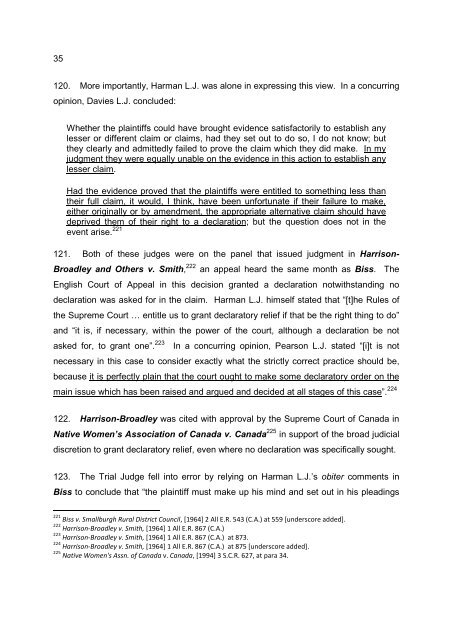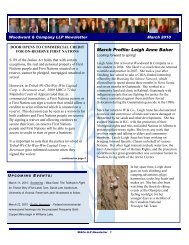Appellants factum - Woodward & Company
Appellants factum - Woodward & Company
Appellants factum - Woodward & Company
You also want an ePaper? Increase the reach of your titles
YUMPU automatically turns print PDFs into web optimized ePapers that Google loves.
35120. More importantly, Harman L.J. was alone in expressing this view. In a concurringopinion, Davies L.J. concluded:Whether the plaintiffs could have brought evidence satisfactorily to establish anylesser or different claim or claims, had they set out to do so, I do not know; butthey clearly and admittedly failed to prove the claim which they did make. In myjudgment they were equally unable on the evidence in this action to establish anylesser claim.Had the evidence proved that the plaintiffs were entitled to something less thantheir full claim, it would, I think, have been unfortunate if their failure to make,either originally or by amendment, the appropriate alternative claim should havedeprived them of their right to a declaration; but the question does not in theevent arise. 221121. Both of these judges were on the panel that issued judgment in Harrison-Broadley and Others v. Smith, 222 an appeal heard the same month as Biss. TheEnglish Court of Appeal in this decision granted a declaration notwithstanding nodeclaration was asked for in the claim. Harman L.J. himself stated that “[t]he Rules ofthe Supreme Court … entitle us to grant declaratory relief if that be the right thing to do”and “it is, if necessary, within the power of the court, although a declaration be notasked for, to grant one”. 223In a concurring opinion, Pearson L.J. stated “[i]t is notnecessary in this case to consider exactly what the strictly correct practice should be,because it is perfectly plain that the court ought to make some declaratory order on themain issue which has been raised and argued and decided at all stages of this case”. 224122. Harrison-Broadley was cited with approval by the Supreme Court of Canada inNative Women’s Association of Canada v. Canada 225 in support of the broad judicialdiscretion to grant declaratory relief, even where no declaration was specifically sought.123. The Trial Judge fell into error by relying on Harman L.J.’s obiter comments inBiss to conclude that “the plaintiff must make up his mind and set out in his pleadings221 Biss v. Smallburgh Rural District Council, [1964] 2 All E.R. 543 (C.A.) at 559 [underscore added].222 Harrison-Broadley v. Smith, [1964] 1 All E.R. 867 (C.A.)223 Harrison-Broadley v. Smith, [1964] 1 All E.R. 867 (C.A.) at 873.224 Harrison-Broadley v. Smith, [1964] 1 All E.R. 867 (C.A.) at 875 [underscore added].225 Native Women's Assn. of Canada v. Canada, [1994] 3 S.C.R. 627, at para 34.



